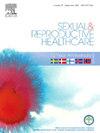妇女对产后抑郁症的生物学原因和潜在的基因组风险标记的认知:一项定性研究。
IF 1.7
3区 医学
Q3 PUBLIC, ENVIRONMENTAL & OCCUPATIONAL HEALTH
引用次数: 0
摘要
产后抑郁症影响10-15%的女性。新的证据表明,增强对雌二醇信号敏感性的基因组标记可能有助于识别产后抑郁症高危妇女。我们探讨了女性对产后抑郁症基因组风险标记检测的看法。方法:采用现象学方法对13名有产后抑郁症病史的丹麦妇女进行半结构化访谈。一个跨学科的研究小组对访谈进行了主题分析。通过潜在的概念,我们揭示了妇女对产后抑郁症基因组风险标记检测的看法。结果:我们确定了三个关键主题。1)生物学是导致产后抑郁的一个因素。只有少数女性认为产后抑郁症可能与荷尔蒙变化的敏感性有关。2)外部事件在理解产后抑郁中的作用。大多数女性认为她们的产后抑郁症主要是由外部因素而不是生物因素引发的。3)产后抑郁基因组风险标记检测的潜力尚不明确。一些女性认为,对基因组风险标记进行检测有可能预防产后抑郁症,减少耻辱感。然而,与此同时,知道他们的风险被认为有可能诱发抑郁症状。结论:我们发现,对一些妇女来说,基因组风险标记的知识为可能的预防带来了希望,同时也带来了对诱发抑郁症状的担忧。我们建议,如果在风险分析中实施新的基因组风险标记技术,就要考虑到这些看法。本文章由计算机程序翻译,如有差异,请以英文原文为准。
Women’s perceptions of biological causes and potentials of genomic risk markers in postpartum depression: A qualitative study
Introduction
Postpartum depression affects 10–15% of women. Novel evidence suggests that genomic markers for enhanced sensitivity to estradiol signaling may help identify women at high risk of postpartum depression. We explored the women’s perceptions of testing for genomic risk markers for developing postpartum depression.
Methods
We conducted semi-structured interviews with 13 Danish women who had a history of postpartum depression using a phenomenological approach. A transdisciplinary group of researchers analyzed the interviews thematically. Through the concept of potentiality, we unfolded the women’s perceptions regarding testing for genomic risk markers for postpartum depression.
Results
We identified three key themes. 1) Biology as a contributing factor to postpartum depression. Only a few women thought postpartum depression could be related to a sensitivity to hormonal changes. 2) The role of external events in making sense of postpartum depression. Most women perceived their postpartum depression as primarily triggered by external factors rather than biological factors. 3) The ambiguous potentiality of testing for genomic risk markers of postpartum depression. Testing for genomic risk markers was envisioned by some women as having the potential to prevent postpartum depression and reduce stigma. Yet, at the same time, knowing their risk was perceived as holding the potential to induce depressive symptoms.
Conclusion
We found that to some women, knowledge about genomic risk markers introduced hope regarding possible prevention and, at the same time, it introduced concerns about inducing depressive symptoms. We suggest considering such perceptions if implementing new genomic risk marker technologies in risk profiling.
求助全文
通过发布文献求助,成功后即可免费获取论文全文。
去求助
来源期刊

Sexual & Reproductive Healthcare
PUBLIC, ENVIRONMENTAL & OCCUPATIONAL HEALTH-
CiteScore
2.70
自引率
5.60%
发文量
73
审稿时长
45 days
 求助内容:
求助内容: 应助结果提醒方式:
应助结果提醒方式:


